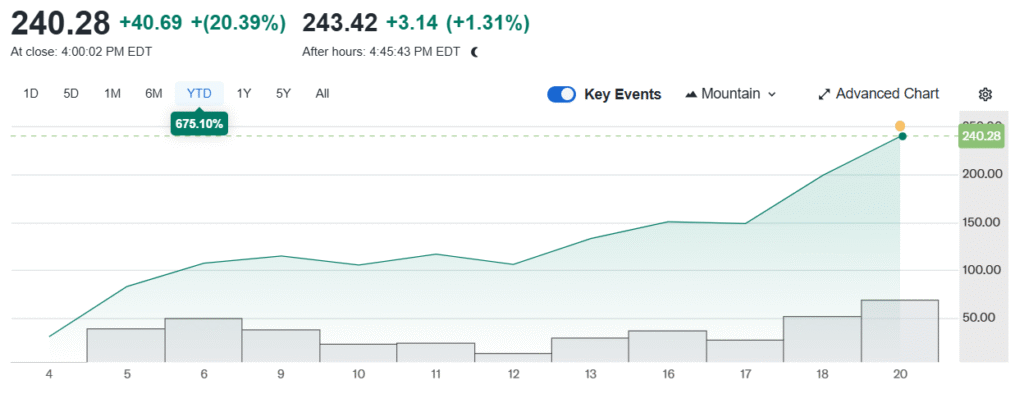Circle Internet Group is once again in the spotlight, with its stock price jumping sharply this week. After already climbing more than 33% on Wednesday, its value climbed a further 15% in early premarket trading on Friday. The surge follows the U.S. Senate’s recent approval of new legislation targeting the stablecoin market. With this vote, Circle, which trades under the ticker CRCL, gains strong momentum just weeks after going public.
The GENIUS Act – passed by a clear majority in the Senate – is being viewed as a possible turning point for regulation in the cryptocurrency sector, particularly for companies tied to stablecoin issuance.
Read also: What the GENIUS Act Means for Stablecoin Regulation
Table of Contents
CRCL Soars 675% in Just 16 Days
CRCL stock was priced at $31 when Circle made its market debut on June 5. Since then, its rise has been crazy. As of June 21, shares were trading above $240, translating into a price gain of over 675% in just over two weeks. Much of the latest rally stems from investor optimism tied to the GENIUS Act, which promises regulatory clarity for the stablecoin market.

On Wednesday alone, CRCL shares jumped 33%, and despite a partial pullback, they remained up by more than 12% during early Friday trading hours.
The Senate’s 68–30 vote on June 17 appears to have sparked the recent investor activity. Analysts suggest the bill’s implications could significantly reshape how stablecoins are issued and managed, particularly in the United States. Jeremy Allaire, Circle’s CEO and co-founder, said after the vote:
“History is being made, as the US Senate passes the GENIUS Act, taking us one step closer to breakthrough legislation being signed into law that will drive US economic and national competitiveness for decades to come.”
GENIUS Act Introduces First Federal Regulation for Stablecoins
The GENIUS Act – short for Guiding and Establishing National Innovation for U.S. Stablecoins Act – is the first federal bill aimed at placing stablecoin activity under formal U.S. regulation. One of the central requirements of the legislation is that every dollar of stablecoin issued must be backed by an equivalent dollar in liquid reserves, including U.S. currency or short-term Treasury bills. This one-to-one ratio applies to all issuers, with additional disclosure rules for those circulating more than $50 billion.
Issuers are also required to publish monthly updates detailing the exact makeup of their reserves while undergoing yearly audits to ensure compliance. This is intended to remove any doubt about the backing of digital assets like Circle’s USDC or EURC, increasing transparency and investor confidence.
Circle currently operates the second-largest stablecoin in the market, USDC, with a value of over $61 billion. In comparison, Tether – the dominant player in this space – has a valuation exceeding $155 billion.
Read also: Tether Is Preparing First Full Audits For USDT Transparency
New Structure for Stablecoin Regulation
The GENIUS Act introduces a dual system of oversight. Issuers handling more than $10 billion must comply with federal regulation, while smaller issuers can remain under state-level supervision if they meet standards described as “substantially similar.” This split aims to allow smaller players to continue operating under state frameworks, while ensuring larger issuers like Circle meet national compliance rules.
The bill’s authors describe the framework as a balance between maintaining flexibility and ensuring financial stability. If passed by the House, the law would be the first to directly regulate stablecoin reserves, transparency, and auditing procedures under a unified standard.
Though some groups are raising concerns – such as the Conference of State Bank Supervisors, which has called for changes to the bill – its current form has already drawn positive reactions from investors. But if the legislation fails to pass the House, the current optimism could fade quickly.
Read also: What the GENIUS Act Means for Stablecoin Regulation
Circle’s IPO Timing Pays Off
Circle’s decision to go public on June 5 appears increasingly well-timed. The company has capitalized on favorable political momentum and growing institutional interest in digital finance. Within just 16 days of listing on the New York Stock Exchange, CRCL stock has seen one of the most explosive early performances of any fintech offering in recent years.
While its stablecoin offerings have long attracted attention, the sudden boost from the GENIUS Act has added a new dimension to Circle’s prospects. Regulatory clarity is often seen as a prerequisite for greater institutional adoption, and the Senate’s vote sends a strong signal that the U.S. is moving in that direction.




